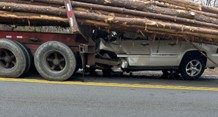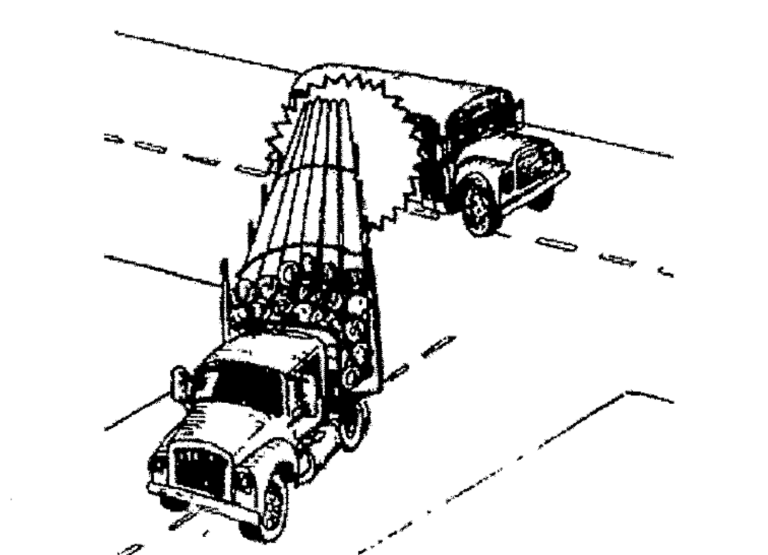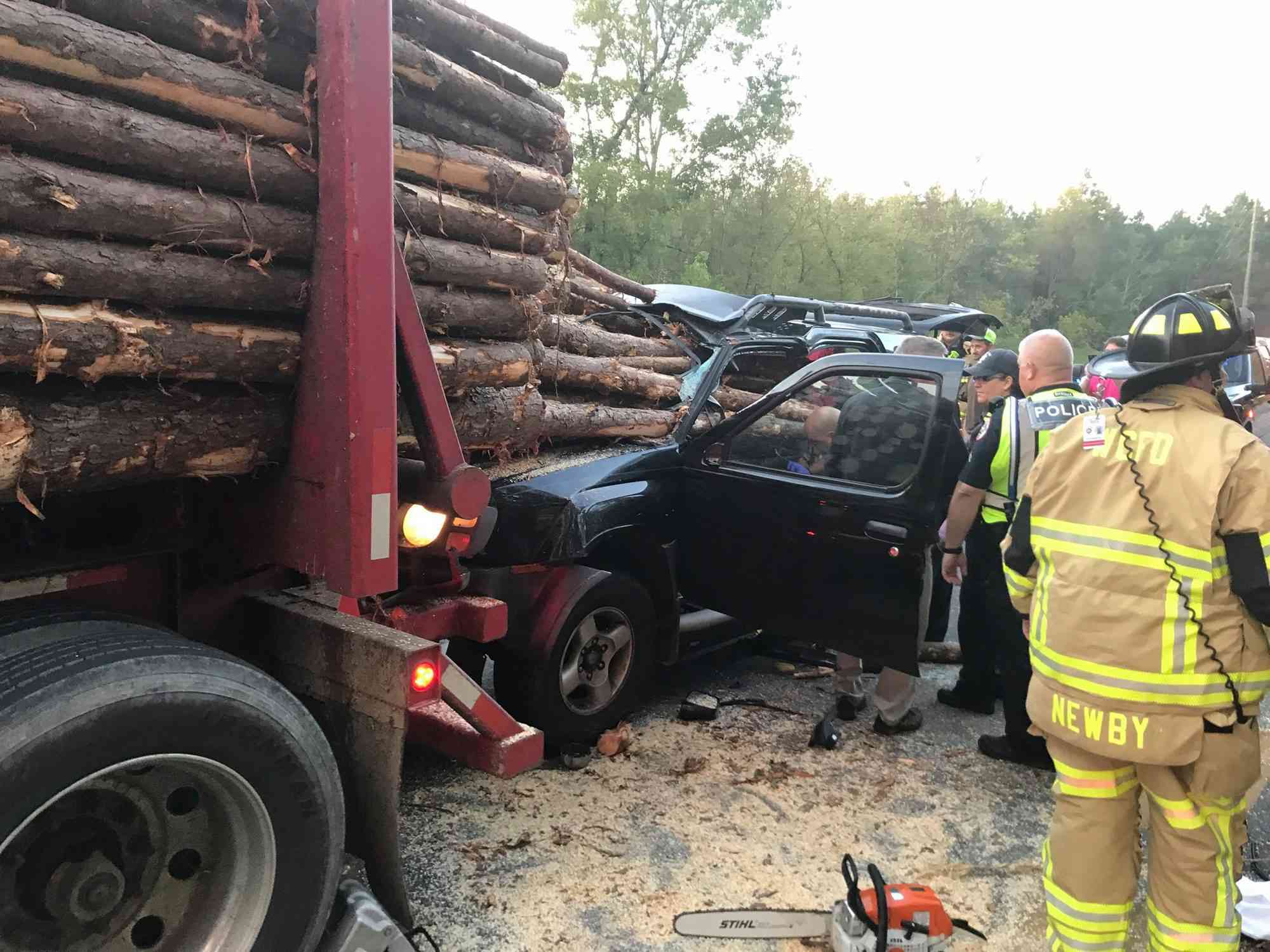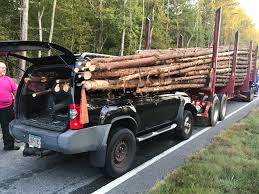Georgia Log Truck Accidents

Pulpwood pine forests and paper mills are dominant features across most of rural Georgia. The forest products industry has a strong presence in Georgia’s economy and politics, so log truck safety rules and enforcement are lax. Our attorneys have long experience representing Georgians badly injured and families of those killed in nasty crashes with dangerously loaded and poorly maintained log trucks all across Georgia. We won’t publish our “secret sauce” for the insurance company representatives to see, but here are some points that often come up.
See also truck accident information center and information on concrete mixer truck accidents, dump truck accidents, log truck accidents, tire and wheel off truck accidents, truck accidents in bad weather, and reasons to file a truck accident case in Georgia.
FAQ: Why are Georgia log truck accidents so dangerous?
Log trucks in Georgia often carry extra-long logs that stick out a car length or more behind the trailer. These logs can be hard to see, especially at night, in morning or evening twilight, or in poor weather. If a car hits the end of these logs, the results can be deadly. In many other places around the world laws forbid such long load overhangs. Lawyers at Johnson & Ward have successfully families of numerous people killed or seriously injured by overlength log loads.
How much insurance are Georgia log trucks required to have?
Even in 2026, Georgia only requires $100,000 in liability insurance for log trucks that stay within the state. That’s not enough for cases involving serious injury or wrongful death. We have fought these battles many times know how to find extra layers of insurance to help victims recover much more. In a recent case, a log truck had only $100,000 insurance coverage but lawyers at Johnson & Ward were able to recover $1,600,000.
Can long logs block a following driver’s view of a truck’s tail lights?
Yes. Logs that stick out too far from the end of a trailer can bounce down toward the pavement, hide the truck’s lights, and make it hard for other drivers to tell how long the load is. This creates visual confusion and increases the risk of crashes—especially in darkness or morning or evening twilight. Lawyers at Johnson & Ward have successfully represented victims in cases where overlength log loads bouncing behind tail lights obscured visibility to following drivers.
FAQ: Do long logs swing out on turns?
Yes. Tail swing happens when long logs swing wide during turns. They can strike vehicles in nearby lanes. We represented the family of a man killed when a log truck attempted a U-turn on a divided four-lane highway in predawn darkness, leaving his long load of logs extending like an invisible black fence across an entire traffic lane.

FAQ: Are Georgia’s rules on log truck safety strong enough?`
No. Log trucks that stay inside the Georgia state lines are supposed to follow theGeorgia Forest Products Trucking Rules, not the tougher Federal Motor Carrier Safety Regulations that govern big trucks that cross state lines, or the Georgia Transportation Safety Rulebook that applies to other types of trucks operating only in Georgia. These state rules were heavily influenced by the logging industry and don’t adequately cover many serious dangers, like long logs sticking far off the trailer.
FAQ: Does Georgia check log trucks for safety?
Not enough. Georgia law says the end of the load must have a red flag and a red light plainly visible from 500 feet. However, most log trucks on the highway have only a poorly maintained load light, barely visible at 50 feet, and the flags are often just stained rags. Deputy sheriffs in rural counties where log trucks operate are rarely trained on what to look for and often have friends and relatives employed in the logging industry. The few state enforcement officers are spread too thin, so unsafe trucks usually go unchecked.
FAQ: Are Georgia log truck drivers well-trained?
No. In Georgia, log truck drivers can be as young as 18 and only need basic commercial driver’s license training on how to operate a tractor-trailer. That training does not cover issues specific to log trucks. Most are not taught the special dangers of hauling long logs. This lack of training puts everyone on the road at risk. In a recent fatal crash case, the log truck driver was a recent immigrant from Guatemala who had just learned to drive a truck. He had no training about the specific dangers of log trucks, such as route planning and overly long loads.
FAQ: Are most officers who initially respond to log truck crashes well-trained in log truck safety hazards?
Not often. The routine traffic accident investigation training, even in 2026, does not include crucial details on log truck safety. Without adequate training, a well-meaning officer may miss important details, like how far the logs stick out or how visible the trailer was. If they don’t know to look for something, they don’t ask about it, include it in their reports, or take the right photos. Based on long experience, we know how to ferret out a lot of details the officers may miss.

FAQ: Are rural law enforcement officers and jurors often biased in favor of loggers and log truck drivers?
People naturally tend to view facts through the lens of their life experience. In many rural counties across Georgia, the forest products industry plays a big role in the local economy. Deputy sheriffs, state troopers and jurors likely have friends and relatives employed in growing, harvesting and hauling pine trees to paper and fiber board mills. They are accustomed to seeing unsafe practices in log truck operations and likely rationalize that it must be OK. Through long experience, we have found ways to get these cases into courts in urban counties where judges and jurors are not accustomed to seeing unsafe log trucking practices every day.
FAQ: What bad assumptions do officers and jurors make about anyone who hits long logs hanging off the end of a log truck?
A lot of people assume that the driver who was injured or killed must have been drinking, on drugs, or distracted by a cell phone. It is routine for victims to be checked for alcohol and drugs at the hospital or autopsy, clearing up that question. It is very important to preserve the cell phone without tampering. One of the first things to do is a catastrophic log truck case is to order a forensic examination of the victim’s cell phone to rule out cell phone distraction.

FAQ: What should I do if a family member was badly injured or killed in a log truck accident?
Do not make a recorded or written statement to the insurance company. Preserve the cell phone. Then call a trucking lawyer experienced in log truck crashes.
Call Johnson & Ward at(404)253-7862 or submit our contact form right away. Johnson & Ward, established in 1949, was Atlanta’s first personal injury specialty law firm. We handle car and truck accidents, falls, and serious injury claims, and we only get paid if we win.
Reviewed February 23, 2026 by:
Ken Shigley, senior counsel, former president of the State Bar of Georgia, was the first Georgia lawyer to earn three board certifications from the National Board of Trial Advocacy: Truck Accident Law, Civil Trial Practice, and Civil Pretrial Practice. He was the lead author of eleven editions of Georgia Law of Torts: Trial Preparation and Practice, and received the Traditions of Excellence Award from the State Bar of Georgia General Practice and Trial Section. B.A., Furman University; J.D., Emory University Law School; Certificates in mediation and negotiation, Harvard Law School.
John Adkins, managing partner, experienced in personal injury law, including auto accidents, truck accidents, wrongful death, workers’ compensation, premises liability claims, dangerous or defective products, medical malpractice and related Plaintiff’s tort litigation. B.A., magna cum laude, Kennesaw State University; J.D., Thomas Jefferson Law School.
Ed Stone, partner, personal injury law, including truck accidents, auto accidents, wrongful death, workers’ compensation, premises liability claims, dangerous or defective products, medical malpractice, and related Plaintiff’s tort litigation. B.B.A., Kennesaw State University; J.D., John Marshall Law School.We’ve handled many log truck injury and death cases across Georgia over several decades. Let our experience work for you.












